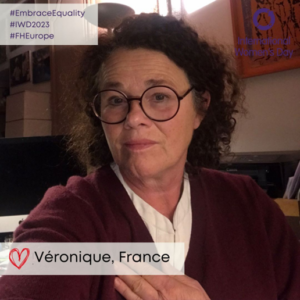Watch this video to hear Joanna share her journey living with HoFH
February was a month of remembrance, advocacy, and renewed momentum across our community. From Rare Disease Day to European policy engagement and research collaboration, we continued advancing earlier detection, equitable care, and stronger patient representation in FH and rare lipid disorders.
Catch up on the key highlights from the February 2026 edition of Heart Beat:
Rare Disease Day is a global moment to highlight the realities faced by people living with rare conditions, from delayed diagnosis to limited treatment options and unequal access to care. For many patients, the challenge is not only the disease itself, but also navigating healthcare systems, finding specialists, and gaining access to life-saving therapies.
In this interview, Joanna shares her experience living with homozygous familial hypercholesterolaemia (HoFH), a rare genetic condition causing extremely high cholesterol levels from birth and significantly increasing the risk of early cardiovascular disease. Her story reflects the long journey many rare disease patients face: growing up with limited treatment options, searching for specialists, and relying on determination, family support, and medical progress to access the care they need. Joanna’s perspective highlights why early diagnosis, innovation in treatment, and more predictable access to care are so important for the rare disease community.
The journey: Where it all started
This illness was already known in my family before I was born, because my older sister had symptoms. In the 70s and 80s in Poland, there were no proper treatment options, and the disease turned out to be the most aggressive type. My sister passed away.
When I was born and doctors found the same condition, they could start acting right away. At first, a liver transplant was considered the best solution, but in the 90s in Poland, this area of medicine wasn’t very advanced, so the decision was postponed while doctors searched for other treatments.
I was taking medications that weren’t originally meant to fight cholesterol. They helped a little, and my health was constantly monitored to see whether atherosclerosis was progressing. My case was consulted with doctors across Europe, and medications and supplements were brought in to support me.
I was very lucky and it was also thanks to my family’s dedication. They took care of me every day from a very young age. Because of that, I managed to stay in good condition and reach 36. Now that medicine has advanced and my treatment is better adjusted, I feel much more at peace about my future.
Can you tell us about your condition and what living with it looks like day to day?
It’s a genetic liver disease where the liver doesn’t have the receptors needed to metabolise cholesterol. In a healthy body, cholesterol is captured and processed by the liver. In mine, it isn’t. Right after I was born, my cholesterol levels were extremely high and kept rising, which meant a real risk of atherosclerosis even in childhood.
Lowering cholesterol has always been essential. Today, thanks to medical advances, life is easier than before, but I still have to stay on medication, follow a healthy diet, and remain physically active. All three are necessary and have become part of my everyday life.
I also wish people understood that this is a disease you can’t see. It doesn’t cause pain and may not limit you day to day, but it’s very dangerous: a silent killer. That’s why early diagnosis and access to the right treatment are so important.
On the importance of access to care
One of the hardest moments was realising that my cholesterol was still too high, even with the strongest medications available in my country. Doctors told me we were already at the limit of what was medically possible. I had to live with the hope that medicine would move forward and that new treatments would eventually appear.
I’ve always known that living with a rare condition is different. Other kids could easily get their medication and see local doctors. For me, everything was more complicated, and there was always some obstacle.
Have things like where you live affected the care you were able to get?
Yes, definitely. Years ago, some cholesterol medications weren’t available in Poland, and there were no specialists where I lived. For many years, I had to travel more than 300 kilometres to the capital to receive treatment.
Access to procedures like apheresis was also very limited, and even today it’s only available in a few larger cities.
A lot of it was about searching on our own: reaching out to doctors, foundations, and people who had experience. Someone would help bring medications from abroad, someone else would connect us with the right specialist. It was about constantly looking and building connections.
I’m hopeful because I’ve seen how quickly medicine can move forward. Through joint efforts, we can get treatments to the people who need them.
How did support make a difference for you?
The community around you matters a lot. It’s very hard to keep searching for information and new therapies on your own.
My parents were incredibly committed to protecting my health, and the support from friends and foundations was priceless. Without it, we wouldn’t have made it.
Do you have a message for other patients?
If you ever feel like the situation is hopeless, try not to face it alone. Look for support: a friend, a doctor, a foundation.
The more of us who speak up and show that we’re here, the greater the chance that someone will listen. Even if a disease is rare, the number of people affected is large enough to deserve attention and real action.
Let yourself be seen. There may be someone nearby going through the same thing, and together you can learn more and do more.
Anything you would like to say to policy and decision-makers?
From a patient’s perspective, stability and predictability in access to care are crucial. Living with a rare disease already requires a lot of energy, and complicated or inconsistent access to treatment only adds more stress.
A coordinated system and clear treatment pathway would make a huge difference. Too often, patients have to connect the dots themselves, between specialists, tests, and administrative processes.
It’s also important to involve patients and patient organisations when designing solutions. There are already models to learn from, but what matters most is turning these ideas into real solutions that work in everyday healthcare.
Rare Disease Day shines a light on the everyday realities of people living with rare conditions—including the long search for answers, the impact of delayed diagnosis, and the importance of access to specialised care and effective treatments.
In this interview, Manfred shares his experience living with familial chylomicronaemia syndrome (FCS), a rare genetic disorder that causes extremely high triglyceride levels and can lead to repeated, painful pancreatitis attacks. Looking back over decades of living with the condition, Manfred describes his journey in phases—from years of hospitalisations and uncertainty, to finally receiving a confirmed diagnosis, and eventually gaining access to a treatment that changed his daily life. His story highlights both the challenges many rare disease patients face and the progress that becomes possible when diagnosis, specialist care, and new therapies come together.
Can you tell us a little about your condition and what living with it looks like day to day?
I usually describe my journey in three phases.
The first phase lasted from 1977 to 2015. During that time, my life was marked by recurring severe pancreatic attacks, usually two or three every year. They were extremely painful and often meant hospital stays. I followed a very strict diet and tried many medications, but my triglyceride levels remained extremely high, around 4000 mg/dl.
The second phase began in 2015, when I was finally diagnosed with familial chylomicronaemia syndrome through molecular genetic testing. Until then, doctors had tried to help, but the diagnosis was only something general like hyperlipidaemia, without knowing the exact cause. After the diagnosis, my diet and medications were adjusted. The attacks became less frequent and less severe, and I no longer needed hospital stays, although my triglyceride levels were still between about 800 and over 1000 mg/dl.
The third phase started in 2020. That’s when I began a new treatment, an injection I give myself every two weeks. I still follow a diet, but I haven’t had a pancreatic attack since then. My triglyceride levels are now between 160 and 300 mg/dl. The biggest change is that the constant fear of the next attack is gone.
For me, the hardest part of the journey was getting the right diagnosis.




How would you describe your access to care during that time?
After many years of repeated pancreatic attacks, I realised that managing this condition would only be possible by working closely with doctors and dietitians. In a way, it became a long-term project that we had to solve together step by step.
I have also been fortunate to live in Austria, where the healthcare system offers strong support. My place of residence, insurance, or cost never prevented me from receiving care. Since 2020, I’ve been able to access a newer medication that has significantly improved my condition. Looking ahead, newer treatments may make things even easier, for example with injections needed less often.
I am very aware that access to the right diagnosis and treatment can make a huge difference for people living with rare diseases.
What kinds of support were most meaningful to you, and why?
I was lucky to be treated at a specialised centre, the Vienna General Hospital. When medications and diet alone were not working well enough, doctors there initiated molecular genetic testing, which finally confirmed my condition.
Having experienced specialists involved made a big difference in understanding the disease and finding the right treatment approach.
What would you want other patients to know from your experience?
If you are newly diagnosed or still searching for answers, my advice is to visit a specialised lipid clinic and find a doctor you trust. And if someone tells you that nothing can be done or that you simply need to eat less fat, don’t hesitate to seek another opinion.
FCS can be caused by different genetic mutations, and choosing the right treatment is not always straightforward. That’s why it’s important to work with specialists who have experience with the condition.
You are not alone, and with the right expertise and persistence, it is possible to find better ways to manage the disease.
Do you have a message to policy and decision-makers?
What I would like decision-makers to understand is that getting the right diagnosis should not take decades. In my case, it took 38 years. Of course, when my symptoms started in 1977, the diagnostic tools available today did not yet exist. But now we have the knowledge and technology.
Genetic testing should not depend on financial barriers. When you compare the cost of testing with repeated hospital stays for pancreatitis, earlier diagnosis and targeted treatment make sense, both for patients and for healthcare systems.
For people living with rare diseases, faster diagnosis and access to specialised care can completely change the course of their lives.

Turning loss into action for Familial Hypercholesterolaemia in France
Véronique Lemaître did not set out to become an advocate. She became one because she understood—through painful personal experience—what happens when familial hypercholesterolaemia (FH) is not diagnosed and treated in time.
A mother first and foremost, Véronique encountered FH within her own family. Cholesterol disorders were known, but poorly understood, inconsistently managed, and too often minimised. Like many families at the time, hers lived with unanswered questions and mixed medical advice.
The sudden loss of her son Baptiste, a second-year medical student who died from a heart attack at a young age, marked a turning point. This preventable tragedy transformed Véronique’s grief into determination: no other family should have to live through what hers had endured.
Building a voice for patients in France
In 2013, Véronique set out to create ANHET.f — the French national patient association dedicated to familial hypercholesterolaemia (FH), and now also elevated lipoprotein (a) Lp(a).
From its earliest days, she worked to structure and develop the organisation, connect patients and families, and engage healthcare professionals. Véronique understood that awareness alone was not enough—systematic screening, early diagnosis, and access to treatment had to become priorities.
Bringing FH to the European stage
Véronique’s commitment quickly extended beyond France.
In 2015, she participated in a call to action at the European Parliament in Brussels, helping to bring FH into European health policy discussions. Her contribution, rooted in lived experience, reinforced a simple but powerful message: FH is a European public-health issue that requires coordinated action.
Listen to Véronique’s call for collective action across Europe to make early screening, awareness, and access to treatment a reality—and to save young people’s lives.
Paris 2018: patients’ stories at the centre
At the FH Europe Annual Network Meeting in Paris in 2018, Véronique once again ensured that patient voices were heard.
She supported the creation and dissemination of ANHET.f’s awareness video—later shared across Europe—designed to make FH visible, understandable, and urgent. The video reflected her conviction, and that of the community she helped build, that early diagnosis saves lives and that real stories can drive real change.
Please listen to Véronique’s message about her son Baptiste—an important reminder for young people not to be misled by this invisible disorder.
Despite language barriers, Véronique worked closely with the FH Europe Foundation, contributing to cross-border collaboration, shared advocacy efforts, and awareness campaigns. She believed deeply in collective action and in the strength of the European FH community.

Photo of Veronique from IWD Awareness Campaign, 2023
Passing the torch, staying engaged
In 2020–2021 (to be confirmed), Véronique chose to hand over the leadership of ANHET.f, becoming Vice-President while supporting a new generation of leaders. It was a thoughtful and generous transition, ensuring continuity for the association she had helped build, while remaining closely involved.
That same spirit guided her decision in 2021, when invited to participate in a high-level technical meeting under the Slovenian Presidency of the Council of the EU. Rather than speaking herself, Véronique proposed that her daughter Charlotte take the floor—giving voice to the next generation and reminding policymakers of the very real human stakes behind FH policies.
Véronique remained a committed, influential, and trusted voice within FH Europe Foundation and had recently been invited to contribute to a new advisory project. Sadly, health complications prevented her from participating
A sudden and unexpected loss
In January 2026, Véronique underwent surgery and appeared to be on the path to recovery. Tragically, only days later, she passed away suddenly, at the age of 64.
Her death came as a profound shock to her family, to ANHET.f, and to the wider FH community across Europe.
A legacy that endures
Véronique Lemaître is remembered as a determined advocate, but also as a woman of generosity, warmth, and deep humanity. Through her work, awareness has grown, screening has advanced, and lives are being protected.
At FH Europe Foundation, we honour her memory by continuing the work she cared about so deeply—ensuring that no family is left unaware, unsupported, or unheard.